This post is part of a series. Links to upcoming posts will be added once published.
When we applied to host WordCamp Europe in Basel, I had no idea just how intense and transformative the experience would be. I’ve already written about that journey, but now that the event is behind us, it feels right to reflect more personally on what it meant to be part of the organising team.
The application team members
The application team in 2024 was in charge of finding the venue and held the first discussions with the city. We applied as the Swiss Community, as Switzerland is small enough that its whole WordPress community can be involved in all usual local events.
Then, members of the application team applied to several organising teams. Pascal Birchler led the Speakers team, Philipp Zeder and Nick Weisser joined the Communications team, Gina Bialas the Photography team, Philippe Krebs the IT team, Claudio Rimann the Design team and Michelle Bulloch and I joined the Local team. See the application team on our application website. Other Swiss contributors later joined the organising team as well.
The Local team
As the Local team lead, my role was to coordinate between the lead organisers and the Local team members, and help ensure that Basel could welcome hundreds of contributors and thousands of attendees. I’m deeply grateful to the people of Basel who supported this adventure from the very beginning. The city and Canton of Basel showed up, not just in logistics, but in spirit. I will share more in a future post about why I love Basel, its people, the Basel Congress Board and Basel Tourismus, and their shared values of humanism and open knowledge, as it deserves its own spotlight. I became a Basler at heart ❤️.
We, as the Local team, were in charge of everything related to catering, ordering swag, working with Production Pool (more below), with the venue: Messe Basel Congress Center and the Basel Congress Board, with local providers such as childcare staff and After-party DJ, planning the three organisers visits in August, November and March, organising the Social event on Thursday, and the organisers brunch on Sunday. Plus countless details such as ordering tokens for drinks and speakers gifts, applying for Swiss and European patronages, or driving the large polystyrene hashtag letters from Torino to Basel (and which were stored for 10 months in Geneva).
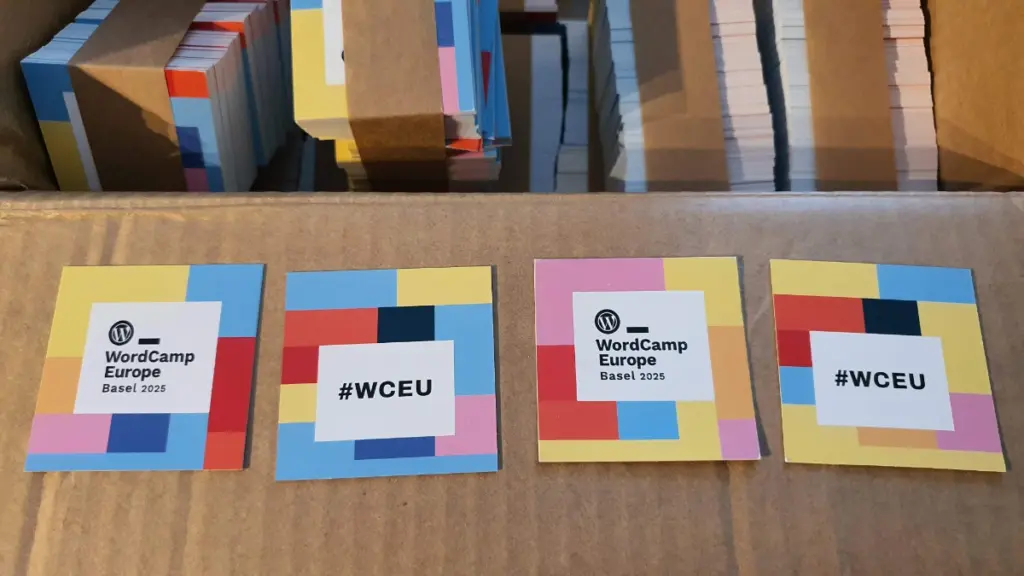
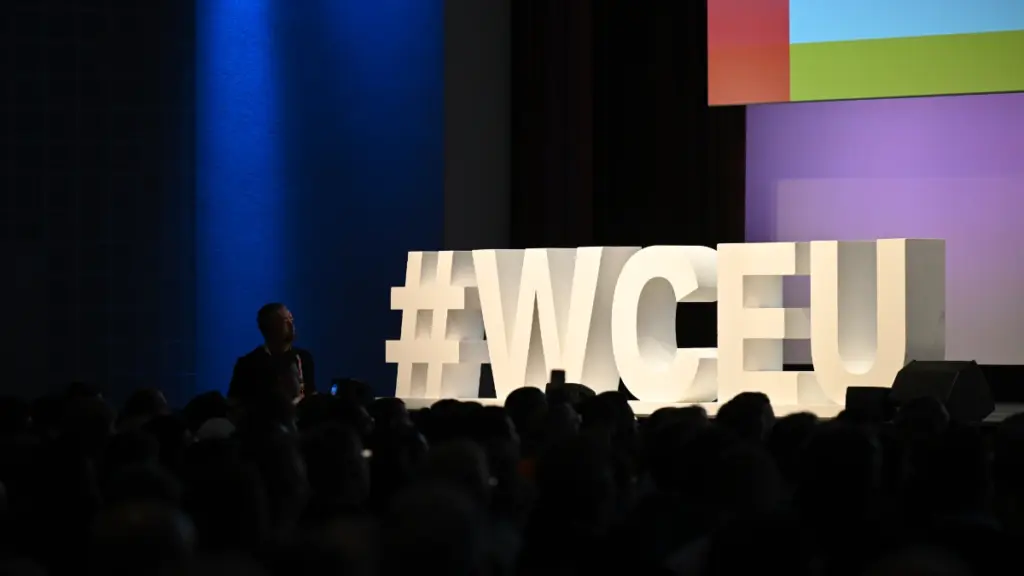
Thank you organisers
I want to thank the Local team members: the three “real Baslers” Alexandra Buck, Silvan Schaad, Matthias Reinholz, as well as my dear friend Michelle Bulloch, also a long-time event organiser in Switzerland and WordPress contributor.
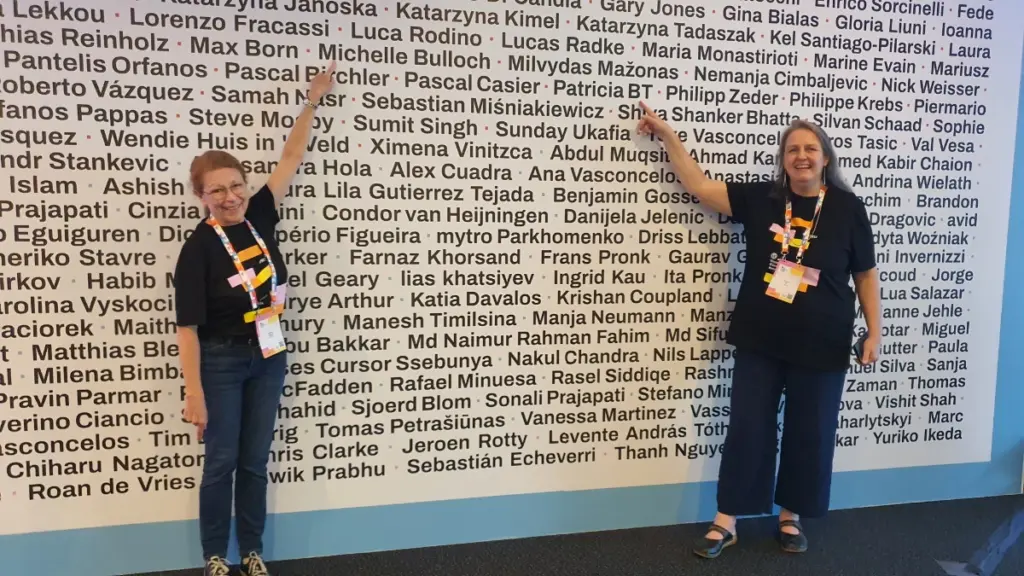
I also want to thank the three lead organisers: Steve Mosby (our automation and spreadsheet wizard 🧙, and who became a true friend), Uroš Tasić (strong leadership, deep knowledge and sharp sense of humour) and Laura Sacco (previous Local lead, from whom I learned a lot).
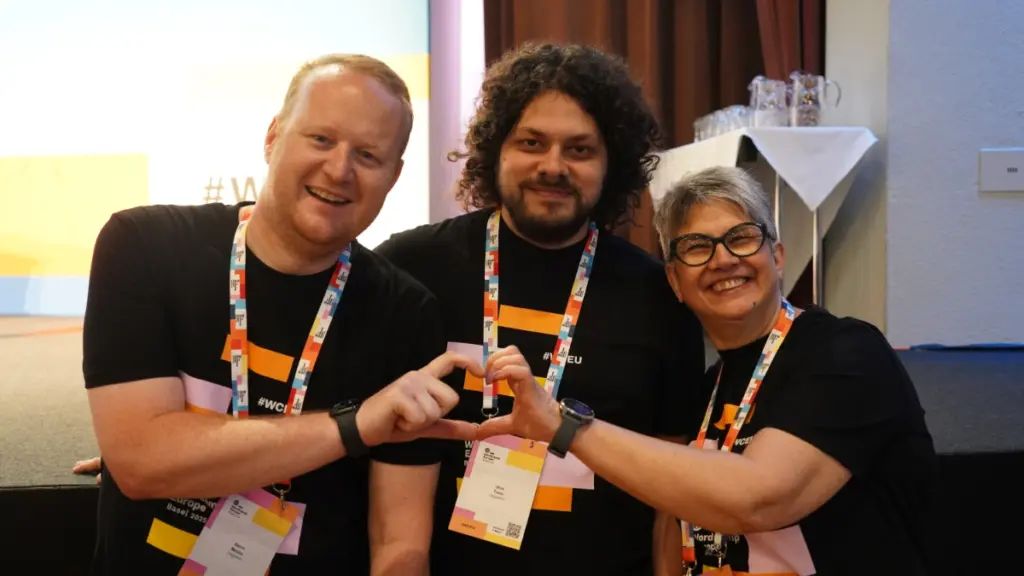
And of course, all the other team leads and the wider organising team for all the great cross-team work. Special mention for the Photography team: see all the amazing photos of the event on the official Flick albums.
I also thank the event mentors: Juan Hernando (one of the 2024 edition’s leads, with a sense of humour which always makes you wonder if he’s serious or joking 😉 ) along with Isotta Peira and Rocío Valdivia.
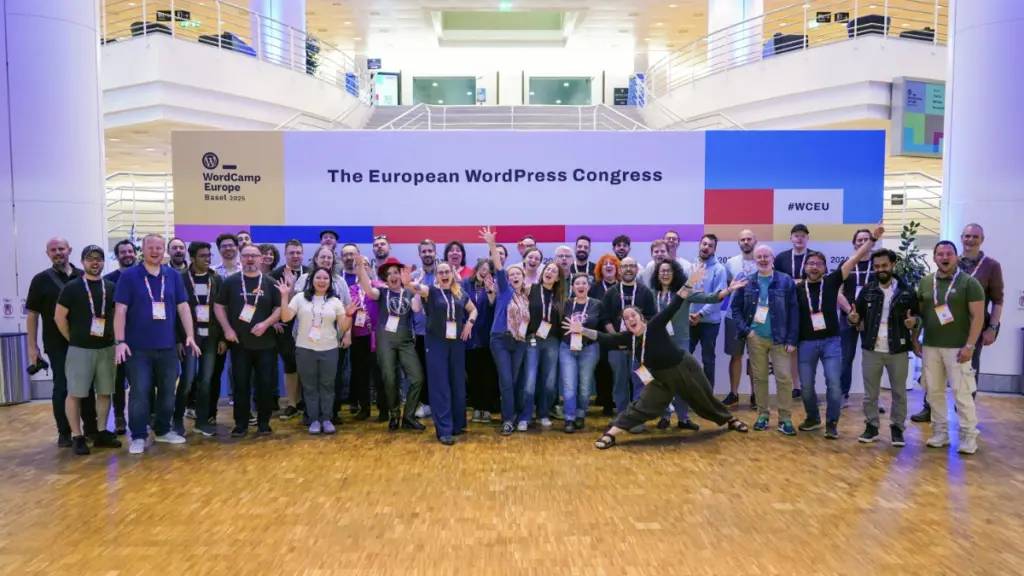
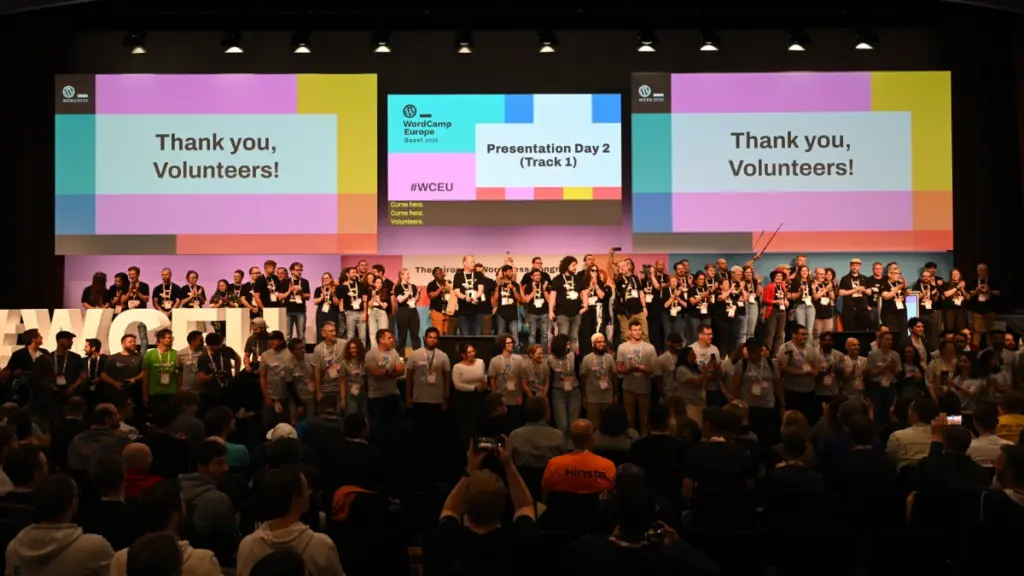
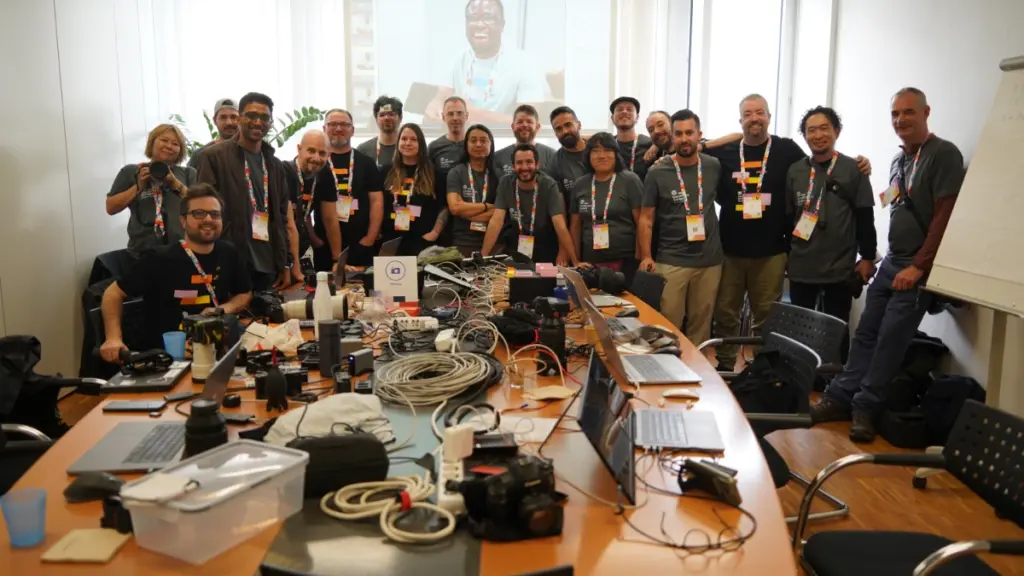
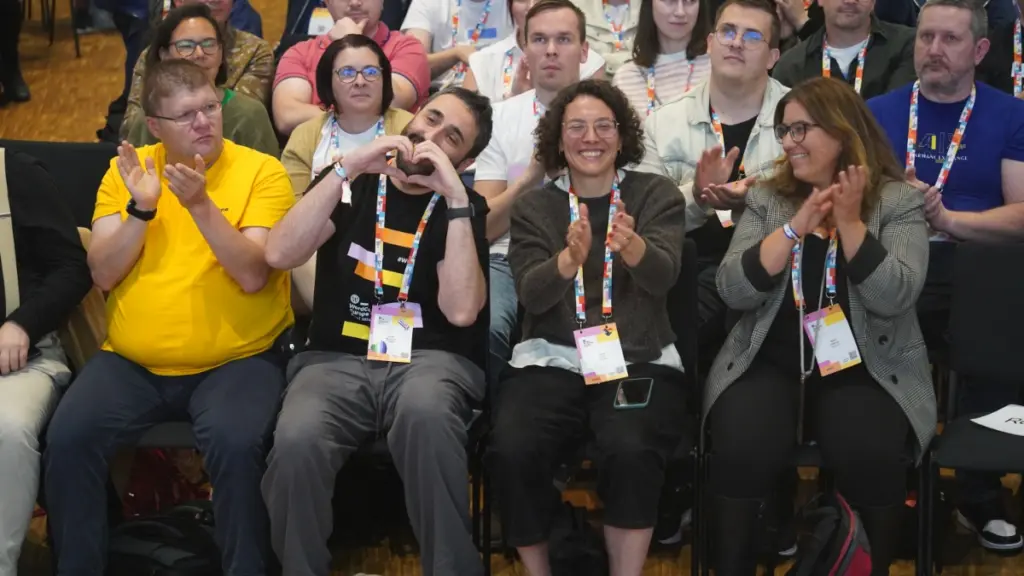
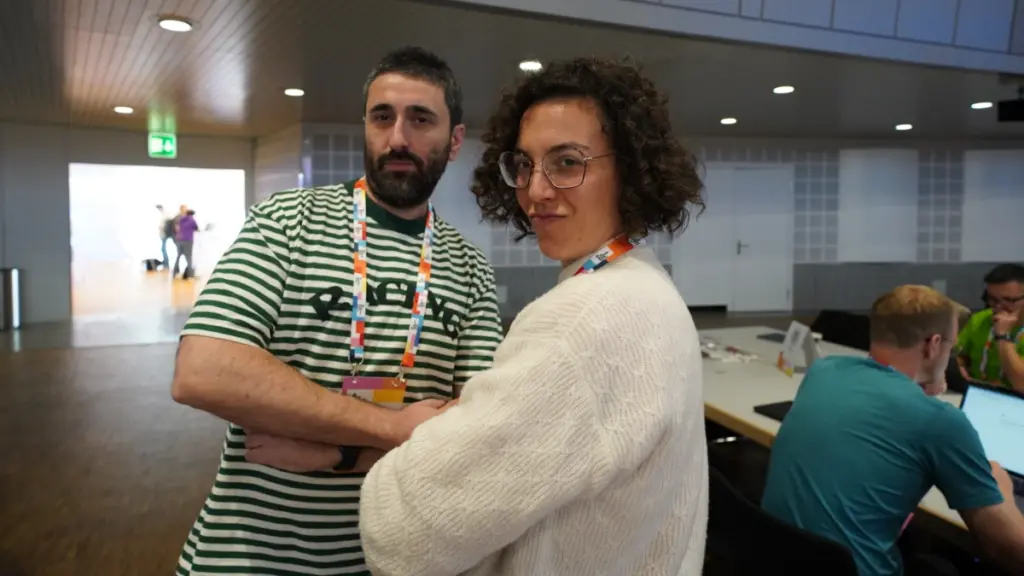
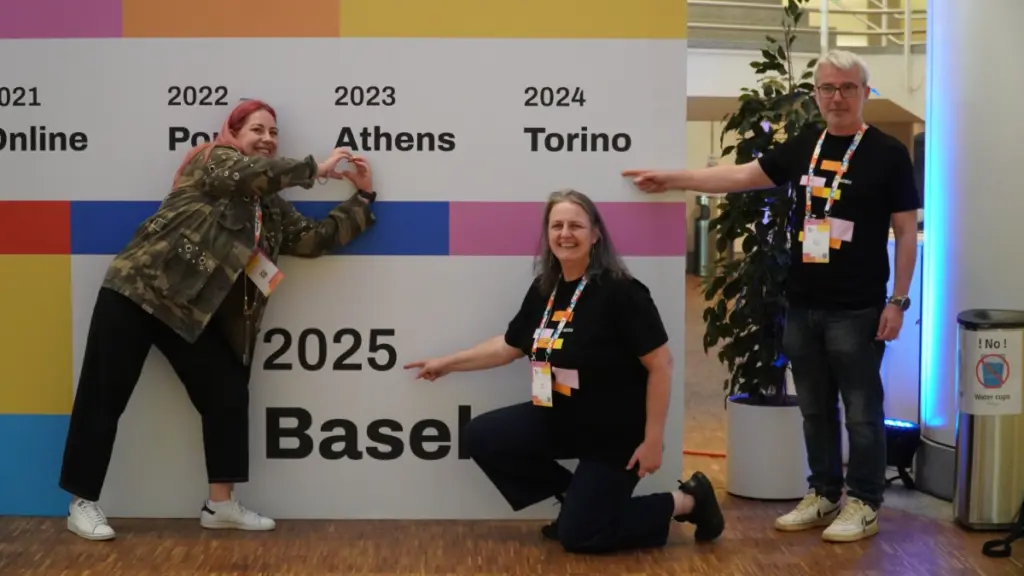
Organising WCEU is a multi-layered endeavour. From the outside, people see a well-run conference, smiling volunteers, and polished talks. But behind the curtain, it’s months of unpaid work, decision making, and countless messages exchanged. It means evenings spent going through spreadsheets (I love them by the way), regular meetings, and navigating last-minute changes and budget restrictions with grace.
It couldn’t have happened without Production Pool
If you enjoyed the seamless experience, the timing, the sound, the lights, the signage, the sponsor area production and all the things that just “worked”, you have Production Pool to thank. They are the silent force in the background since WordCamp Europe 2018 in Belgrade, including the online WordCamp Europe editions of 2020 and 2021. They offer steady guidance and professional support. Their contribution is often invisible to the attendees, but to us organisers, it was invaluable. Without Production Pool, the Local team would need 20 members instead of 5, and would need experts and professionals about a lot of topics, venue and technical expertise, work with local production vendors, as well as negotiating skills. Thank you Mirko, Ilija, Darko and the whole team!
The Social event
The Social event is traditionally held the Thursday of the event, after the Contributor Day. It’s a thank-you event for all who “make” WordCamp Europe: organisers, volunteers, sponsors, speakers and media partners.
During the organisers visit in August 2024, we looked for a venue for the Social event and ended up choosing the “Joggeli”, Joggeli being the nickname for the FC Basel stadium, the St. Jakob-Park. They have an event lounge, and work with the same caterer as the main event one: Wasserman Catering. At the time of choosing, we didn’t even know that 1. FC Basel would become the Swiss Football Super League champion for this season, and 2. that Eurovision Song Contest would be held there at St. Jakob Halle, just across the street, and the stadium would also host its large 30’000-person party, three weeks before WordCamp Europe.
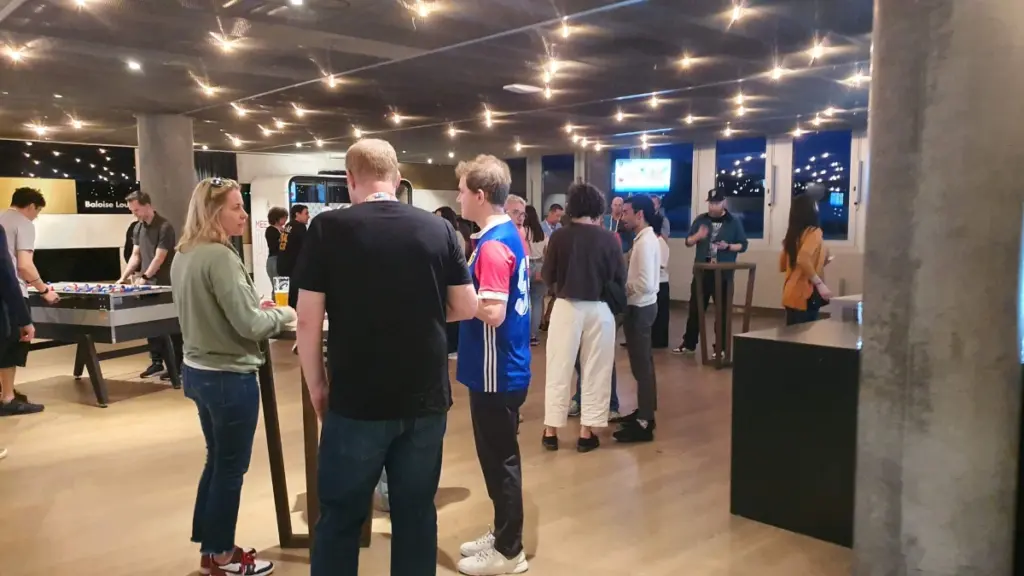
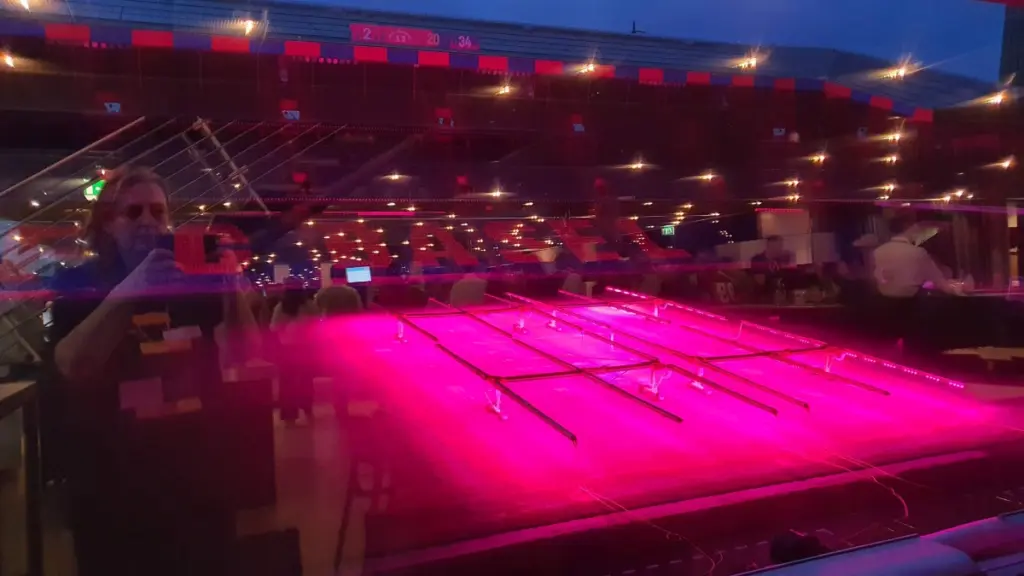
Amidst the WP situation
This year, WordCamp Europe sold 2100 tickets compared to about 3000 in Torino or Athens in 2023 and 2024.
I see two reasons for this. First, Switzerland is seen as more expensive. But quite honestly, with inflation in surrounding countries, the costs have become fairly similar for attendees (except when it comes to food and the low availability of budget hotels). The higher cost was mostly felt on the WordCamp budget itself.
The main reason, in my opinion, is that this edition took place during what many refer to as “the WP Drama” within the WordPress project. Several friends from here and neighbouring countries told me they wouldn’t attend, volunteer, speak, or help organise any official event until the WordPress governance issue is resolved. This is not just “3% negative”, as Matt Mullenweg seems to suggest. There is a real and deep fracture in the community between most of its members and the leadership. Fortunately, there are also initiatives that emphasise unity and work to build solutions.
My feelings about it are mixed. I’m writing another post on the topic and you can read my previous “I declare” paragraph in My freedom as an open source contributor post and below in the “A turning point?” paragraph.
This affected the organisation of the event in several ways:
Loss of organisers
In October 2024, we lost some organisers. One specific person who left told me, “I cannot stay, as we have been asked not to comment on the current situation, thus my freedom of speech is hindered.” I deeply respect that and share the sentiment. I couldn’t leave myself, as it was “our year”, but it affected me as well, and by the way, I didn’t completely stay silent.
Loss of sponsorships
Several usual sponsors didn’t even apply. After what happened to WPEngine in September, when Matt exposed them publicly, some companies didn’t want to take the risk: “What if we are the next?”. Other companies applied but were not accepted for trademark reason. While I understand and share the need to protect the WordPress trademark, I think that refusing sponsors because they use “WordPress Hosting” instead of “Hosting for WordPress” is over the top. A relief is when we learned that the loss of income for refused sponsors would be covered.
Loss of attendees and volunteers
See my above paragraph, For both attendees and volunteer applications, we saw 2/3 of previous years numbers.
Constant discussions
It was constant and exhausting! It was everywhere, among organisers, during meetings, among attendees, at the event. I saw the “fear of being banned” at all levels and that led me to gather feedback from people (see below “Mary Hubbard is listening“). At some point last autumn, we weren’t even completely sure that the WordCamp would be possible, or that it would go ahead without interference.
A turning point?
I truly believe we are at a defining moment for the whole WordPress project. We represent 43% of the web and share a collective responsibility to ensure its future.
The Five for the Future session
Together with Wes Tatters and the WordCamp Europe Community team, led by Fotis Routsis, we organised an open session to discuss the Five for the Future initiative. Mary Hubbard, Executive Director of the WordPress project, was present. A lot was shared, and it was one of the moments I had most looked forward to throughout the entire event. You can read the notes taken and published by Courtney Robertson.
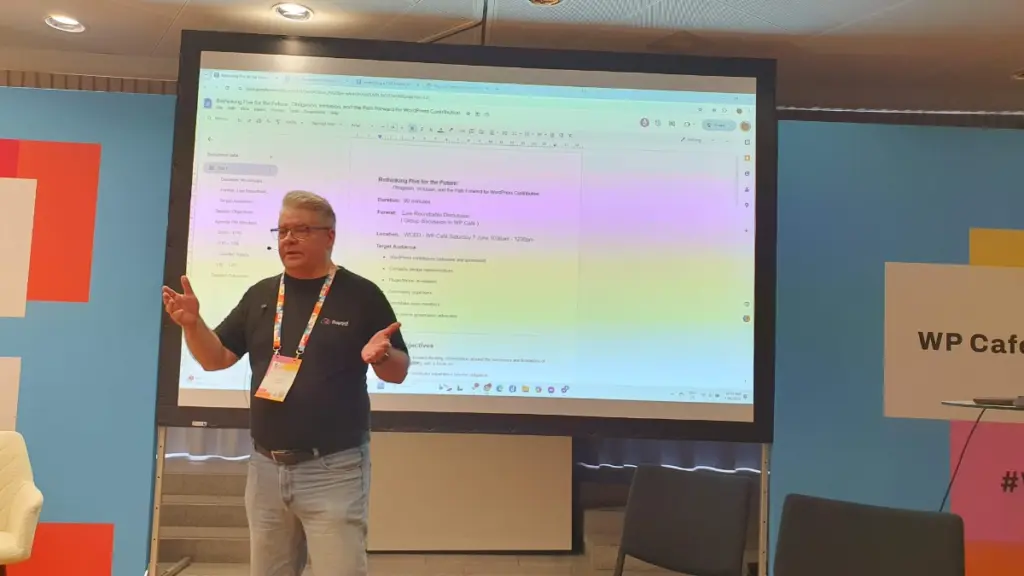
The Sustainability petition
During the Contributor Day, at the Sustainability table (it was wonderful to have one), a petition was started by the people present. Charlotte Bax collected hundreds of signatures, asking for the reopening of the Sustainability team, which had been closed by Matt a few months earlier. Matt and Mary publicly stated during the Q&A that Sustainability must be part of all teams. Well yes, but then so is AI, and there is a new AI team.
Photos of signatures on the Sustainability team signs. Better resolution photos have been given to the Sustainability team.
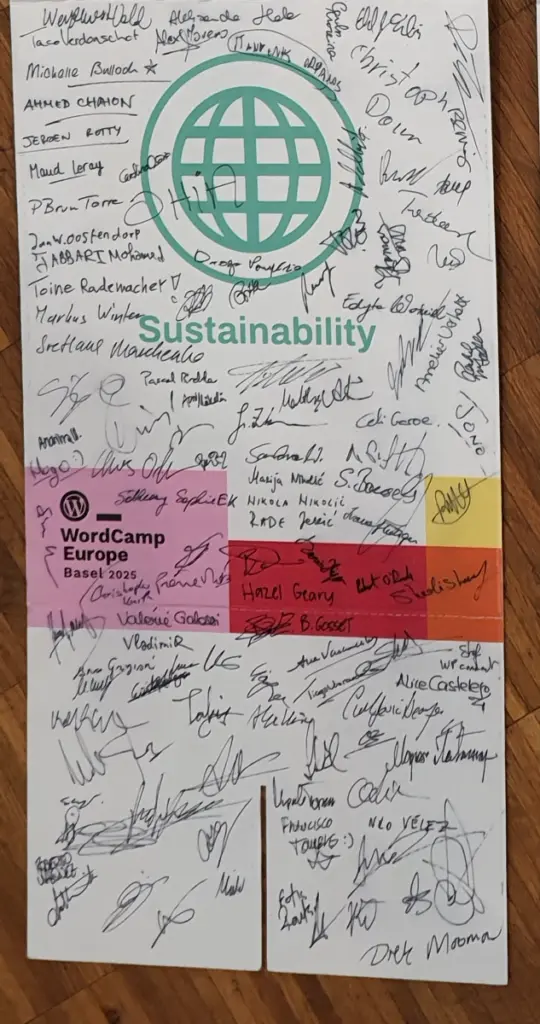
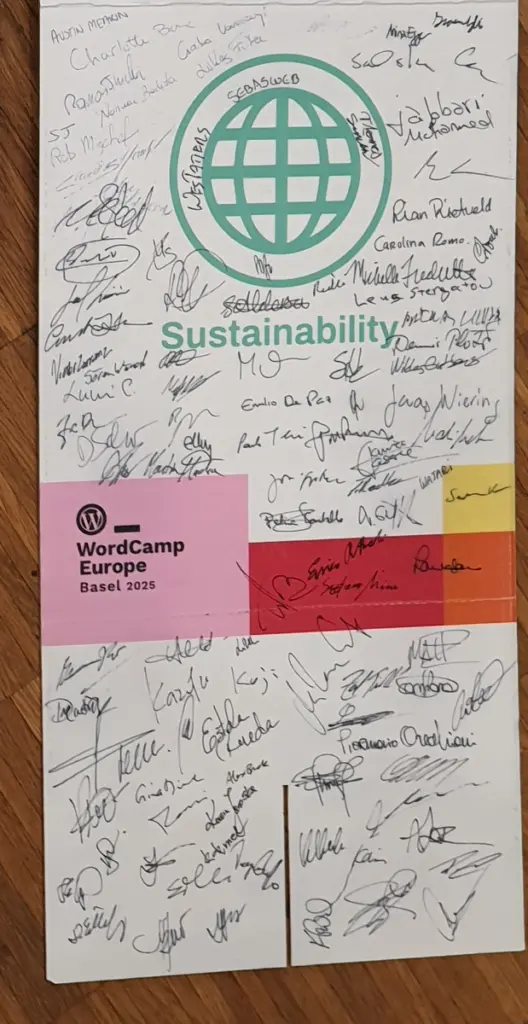
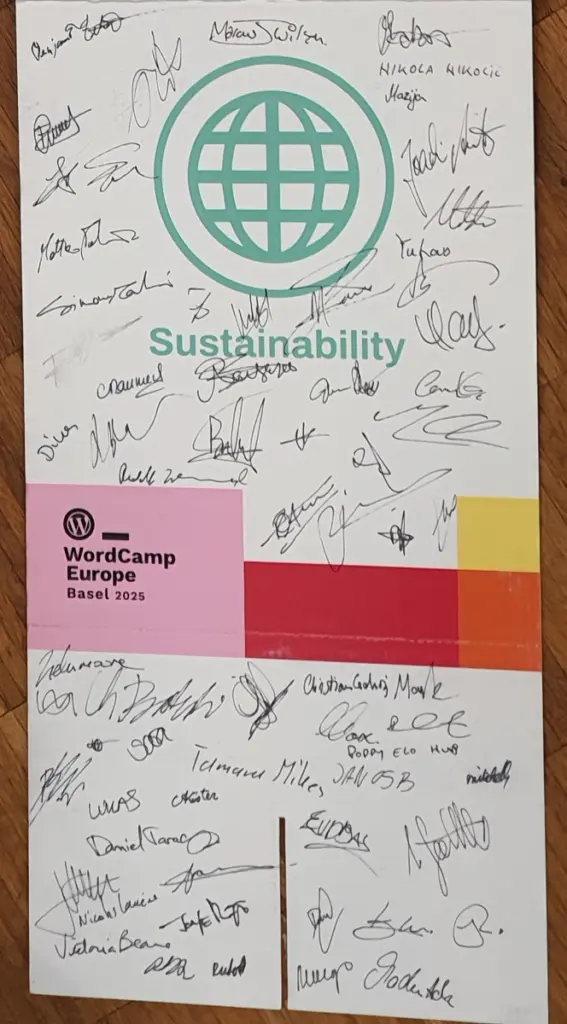
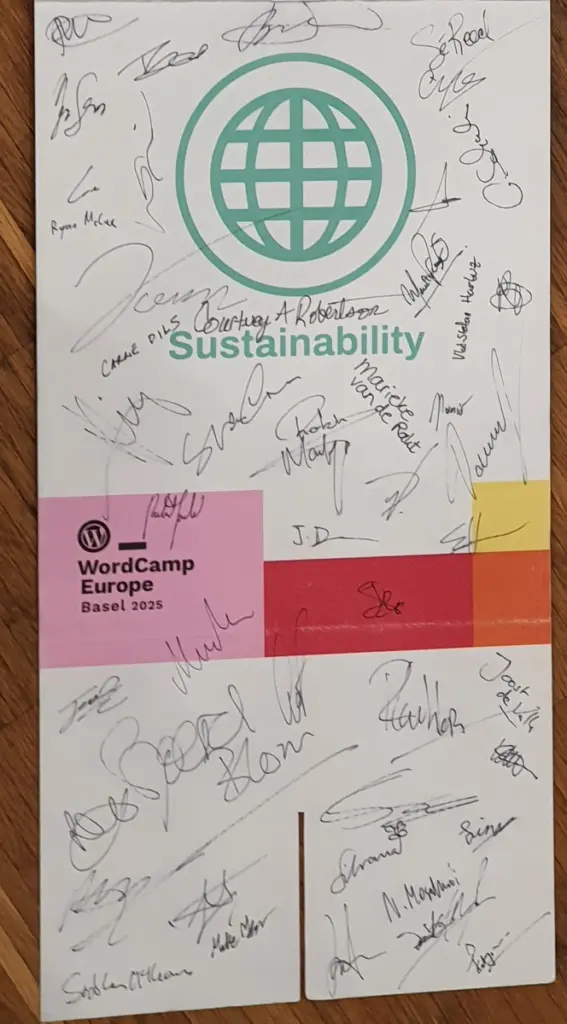
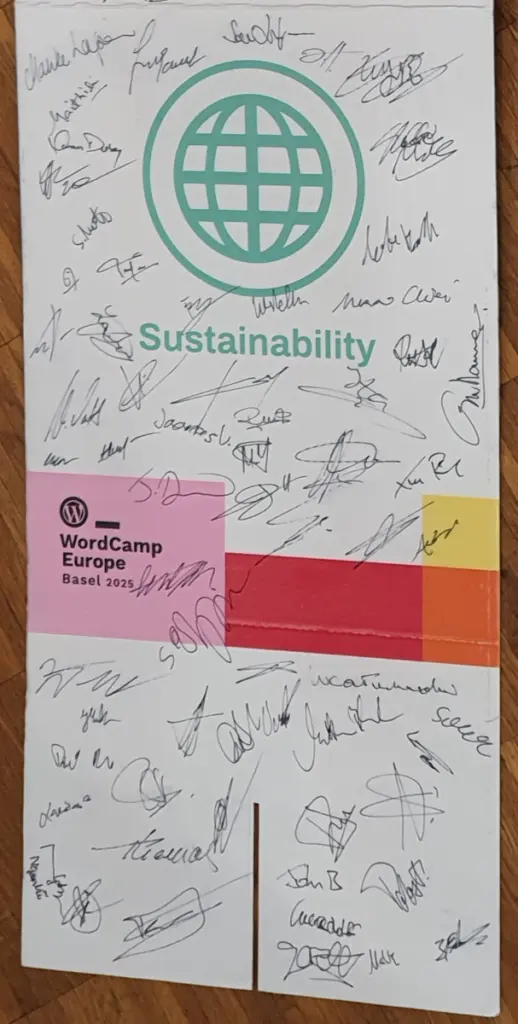
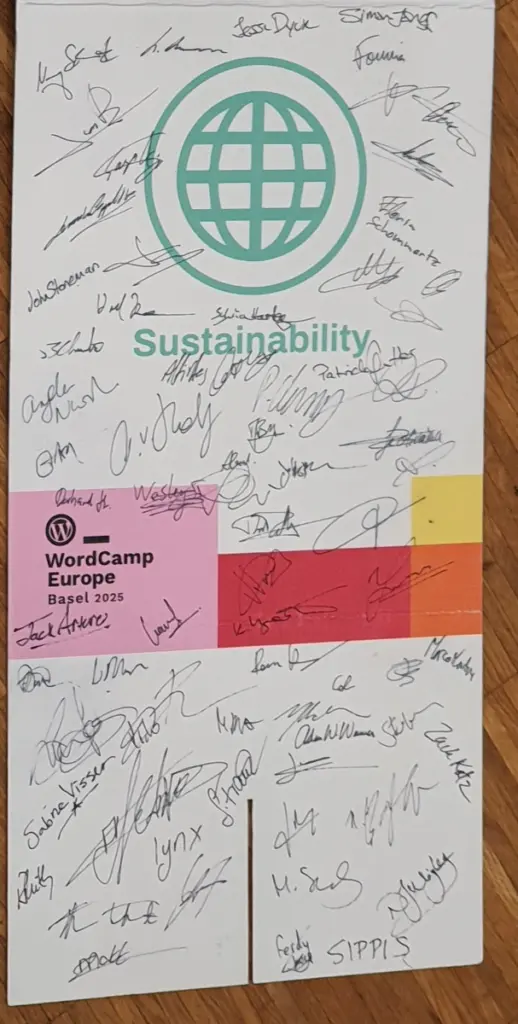
I understand the discussions about rebranding Sustainability, and about separating environmental sustainability from making the project and contributions sustainable. But closing the team on the basis that there wasn’t enough outcome was unfair. Matt often only looks at “shipped code”. That’s not the only metric, or else, are my own contributions worth nothing?
The Sustainability team is not dead. It is now working “in exile”!
Mary Hubbard is listening
We had previously agreed to meet with Mary Hubbard, as I’ve been collecting “community voices” for months from more than a hundred people. I deeply value the idea that all voices should be heard, and I was happy to see that Mary shares that view. My following post talks about the document I shared with Mary and Matt.
The new generation
My 18-year-old son Elias was among the volunteers. He had already volunteered at a local WordCamp in Geneva when he was 15. He enjoyed working at the registration desk and the swag station, and liked working with Severino Ciancio, a long time volunteer and member of the Italian community.
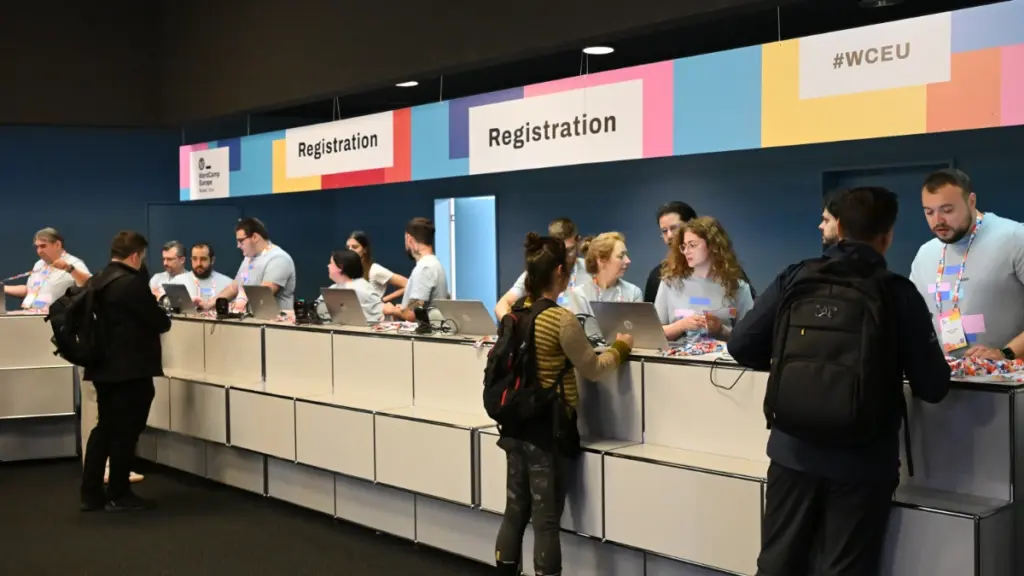
Elias also appreciated a lot working under the lead of Valérie Galassi and Francesco Di Candia (organisers in the Volunteers team). But he wasn’t too keen on walking with me, as I was stopped and hugged every couple of metres, often followed by “yet another conversation” 🙂
It also seemed to me that there were more people in their twenties and thirties involved this year than in previous editions (though I have no official data and may be mistaken), and there was an interesting talk “Teen Meets Veteran: Two Perspectives on WordPress“, by Elin Krauer and Luzi Stadler.
Onboarding the new generation is an important topic in the WordPress project at the moment, and we’re already seeing new initiatives like the Campus Connect events starting to take shape.
The friendships I’ll keep
I’ve been a WordCamp Europe volunteer for years before becoming an organiser for 2024 and 2025, and I attend WordCamps in several countries. I made many friendships over the years, and it’s always such a joy to see people again. Being part of the organising team for 2 years also brought some new friendships. Some of these people have become true friends, and that is perhaps the most precious gift of all. You can read my WordCamp Europe 2024 as a co-organiser.
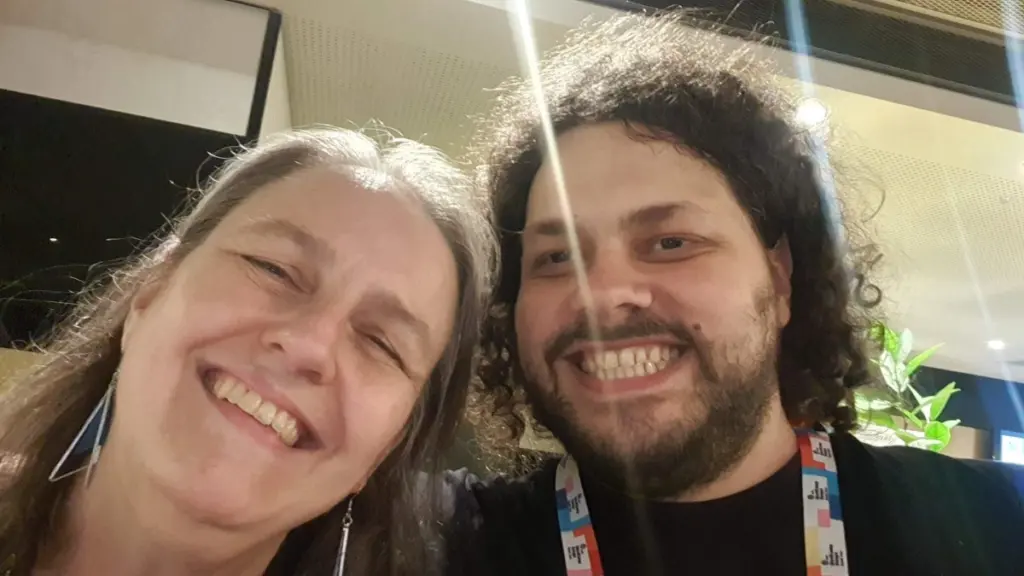
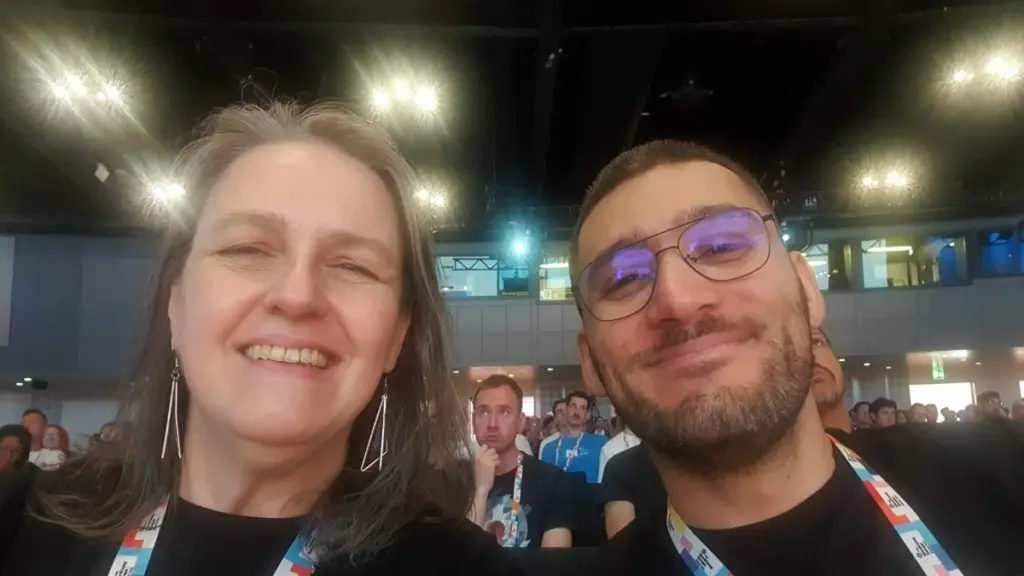
There were people who had been past organisers, local event organisers, long-time volunteers, and others I’ve met at both local and flagship events. I felt uplifted knowing that people from every continent were there (though I’m not sure about Oceania? EDIT: of course: Wes! ). Many of them are fostering communities in their own regions. I consider myself an inclusive person, and I deeply value that sense of connection across cultures, a sense of brotherhood and sisterhood that transcends current political divisions and wars.
To me, it was amazing to have Palestinians, Lebanese, and Israelis, Ukrainians and Russians, all in the same room, peacefully contributing to open source, away from bombs, front lines and their governments’ decisions. The same goes for US citizens, the current shift towards an authoritarian regime in the United States is not reflected at the individual level in our community. May we be an example for an open world.
Why I declined the role of lead organiser for 2026
Shortly before the event, I was invited to step into one of the three lead organiser roles for WordCamp Europe 2026, as it’s often proposed to current year Local team lead. I was honoured to be asked, and for a moment I hesitated. But the answer was clear. I have work to do on my own projects, which I have set aside for far too long. I also would like to apply as a speaker next year, which is not compatible with being part of the organising team. And quite honestly, WCEU 2025 has been my apogée, or “pinnacle” and I didn’t feel it would be balanced or sustainable for me to commit to being a lead organiser for WordCamp Europe 2026 in Kraków.
I will of course attend and most probably contribute to it, whether as a volunteer, a speaker or perhaps by applying as a media partner with one of my projects (not ready at time of writing): CMS Mondo. And maybe I’ll apply as an organiser again in 2027, depending on several outcomes.
The so-called WP Drama also influenced my decision. Working on an official WordPress event means representing the WordPress Foundation, which somewhat limits the freedom (specifically, freedom of speech) I referred to above. I was tired of wondering what I was allowed or not allowed to say, of having to consider everyone’s sensibilities and being forced to have an opinion or take sides, without being able to talk about it.
I didn’t choose to volunteer to an open source project to end up with that kind of mental fatigue. It even led me to pause for two weeks before I could begin writing this post.
Sponsorship
Last year, for Torino, including the organisers’ visits and the event itself, I spent €1’700 of my own money. When I wrote about it, Polylang kindly stepped in and covered all my travel expenses. You can read more in my Thank you Polylang post.
This year, as I was part of the Local team, we were expected to be based in the host city. While I am from Switzerland, I don’t live in Basel, so I still had to travel and rent accommodation. However, I didn’t feel it was fair to raise funds as a “local”.
Fortunately, Themeisle has been my ongoing sponsor since last August, supporting 20 hours a month of my contribution time. Their help allowed me to breathe a little financially, and I’m truly grateful for their continued support. See my Thank you Themeisle post for more.
Not being an organiser for next year means I’ll continue contributing to the WordPress project, but at a pace of around 40 to 60 hours per month instead of the about 80 hours I was dedicating this year (or even more in the last months). You can find more information about my contributions on my Sponsor page, or on my profile on the new SponsorMeWP website.
My ongoing contributions focus on the Five for the Future discussions, being part of the GatherPress team with a focus on community engagement, as well as the Contributor Mentorship program and mentoring other WordCamps. Of course, I still participate in Sustainability discussions, even if that no longer counts as contribution time and those discussions are now held elsewhere.
Some feedback
Eid al-Adha
When we applied to be the 2025 host, we were given the choice between three dates to pre-book the venue: the three first weekends of June, as it has been the case for all WordCamp Europe editions in recent years (though that may change in the future). And Basel hosting the Art Fair from mid-June, the only available weekend was the first one. This led to an issue we were not even aware of: the Muslim celebration of Eid al-Adha. You can read more information about why the community was not aware, as the community calendar did not mention it.
We ARE an inclusive community and it broke my heart when I learned some of my dear friends, such as MD Shahjahan Jewel, would not attend for that reason, and I’m grateful to others who came nonetheless, hoping it didn’t interfere too much with their celebrations. But it wasn’t our fault, the community calendar was incorrect and no one who was aware of this date had suggested a correction in the event organisers handbook (for example: event organisers in Muslim communities). We were as inclusive as always, offering meal choices such as Halal and Kosher and welcoming everyone.
Kosher meals
As the official catering company was not providing Kosher meals, they allowed us to bring in external food. Kosher meals are difficult to produce as all ingredients have to be certified Kosher and cannot be mixed with other food containers. Every year at WordCamp Europe, we plan and order specific Kosher meals for people mentioning it in the form when buying their tickets.
We had to find a company in Zurich, Shalom Catering, certified and working with Zurich airport and airline companies, and have the Kosher food, individually packed, delivered from Zurich to Basel. This is not a small detail and comes with a cost.
At the social event, the four meals for people who had subscribed and requested Kosher food were not claimed. People either didn’t come (without telling us) or ate something else, non-Kosher. On Friday, only four out of 17 meals were claimed. I don’t have the numbers for Saturday, but someone from the Attendee Services team told me it’s the same story every year.
It will probably be easier in Poland in 2026, but I suggest that future organising teams find a solution so that people who request specific meals actually claim them, or let the organisers know in advance if they won’t attend. In the current situation, it’s not sustainable. It’s wasted food, wasted money, and wasted time.
General feedback
There was no coffee at the WP Café: I 100% agree on this one, I had asked to have a coffee machine there, but due to budget restrictions, we couldn’t add another coffee point.
T-shirts: I was very happy with our choice for the printed swag. The T-shirts, by the environmentally friendly company Ecographic, were soft to the touch, not scratchy, as has happened in the past. More information in my post my WordCamp Europe 2025 sustainability post.
Accessibility: I was glad to hear Michelle Frechette being happy about the the venue accessibility in this video from Underrepresented In Tech (and sorry about the restrooms key, we will now know better).
Session selection independence: I’m also glad that the Speakers team had autonomy, with no interference from WordPress leadership. The sessions were diverse and included topics like The Future of WordPress and Sustainability. Well done, team!
Side events
Picnic turning Coffee
I also organised the WordCamp Europe picnic, but due to weather, it turned into more of a “coffee gathering” than a picnic. I had chosen a place with a nearby café for that reason. It was amazing to see around 50 people come, eager to meet before the start of the event. I’ve been doing this since WordCamp Europe 2022 in Porto, and I’ve already spotted the location on maps for the picnic in Kraków 🙂
At the time of payment, about CHF 40 were missing, and I want to thank Krishan Coupland, one of our volunteers, for covering the remaining amount❤️
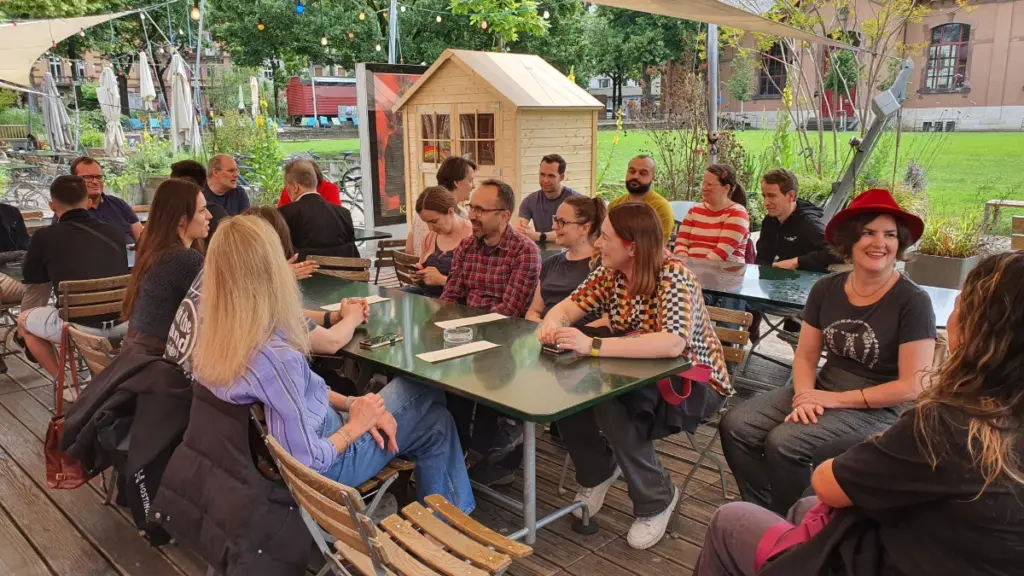
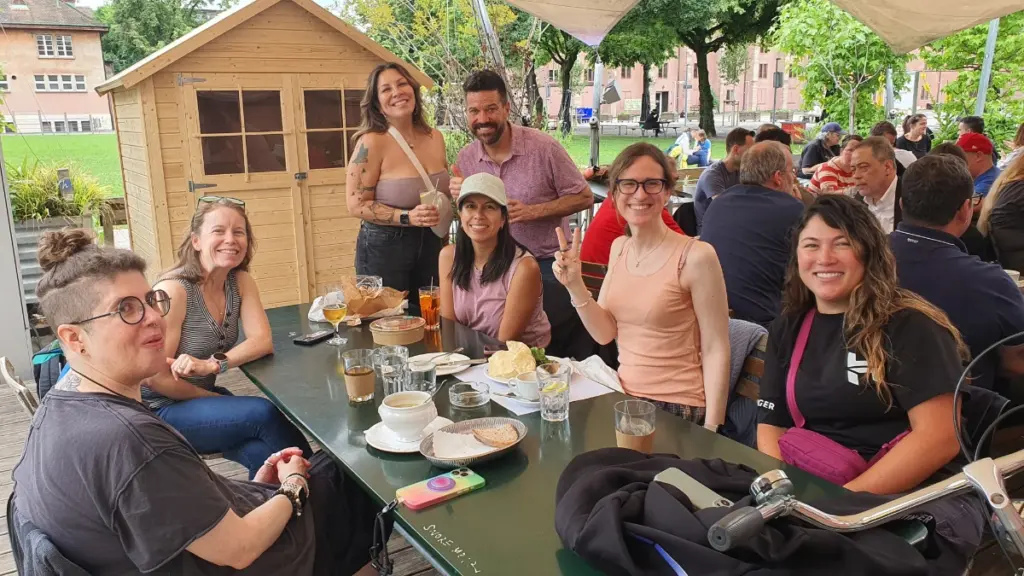
Alt Ctrl Org
When I saw Austin posting about Alt Ctrl Org in January, I thought I could help them find a venue. I already knew about the Klara food court and their friendly staff, so I offered to assist with that. To me, this was fully compatible with being a WordCamp Europe organiser, because I will always promote open source and freedom of speech. These are part of my core values, alongside sustainability, accessibility, and DEIB.
I’m currently writing a full blog post about my positive experience with the Alt Ctrl Org team, as well as the FAIR package manager announcement.
What I’ll take forward
I’ve learned so much, not only about event planning at scale, but about leadership, teamwork, the art of delegation, listening, and trust. I plan to share this knowledge more widely through a free course on Interaction.Site to help others organise meaningful events, whether within the WordPress ecosystem or elsewhere.
I’ll end this post by saying that I felt a lot of emotions thinking “We did it.” We brought so many people to our beloved event and city. We now passed the baton to the Polish Local team led by Sebastian Miśniakiewicz, and the three new lead organisers: Francesco Di Candia, Ivelina Dimova and Angelos Synadakis.
See you next year in Kraków!
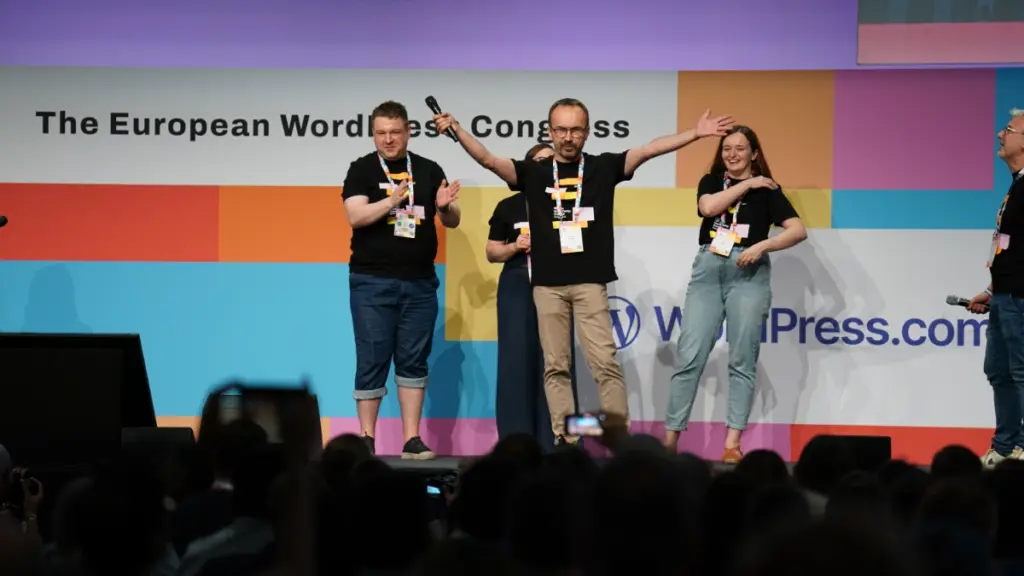
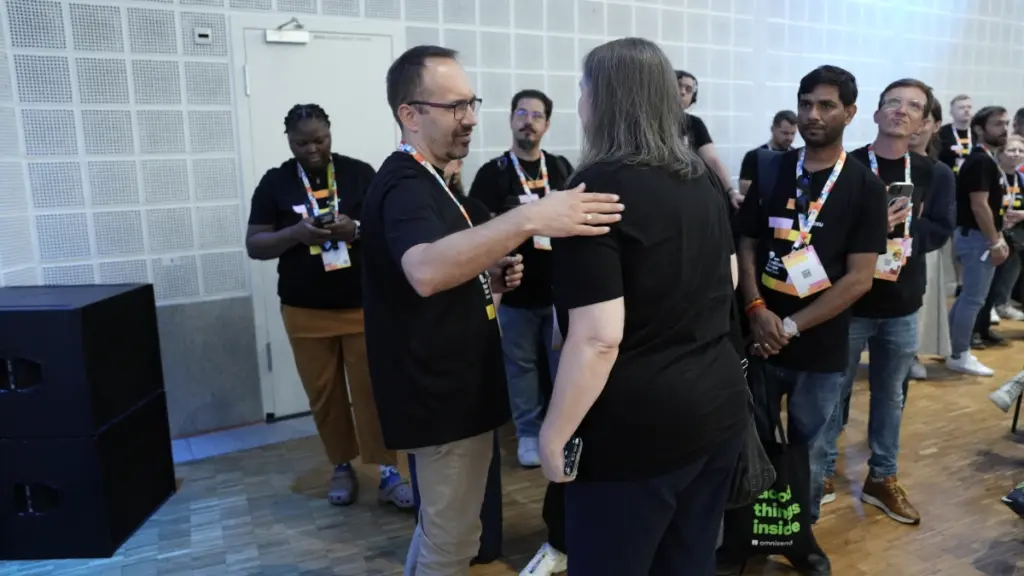
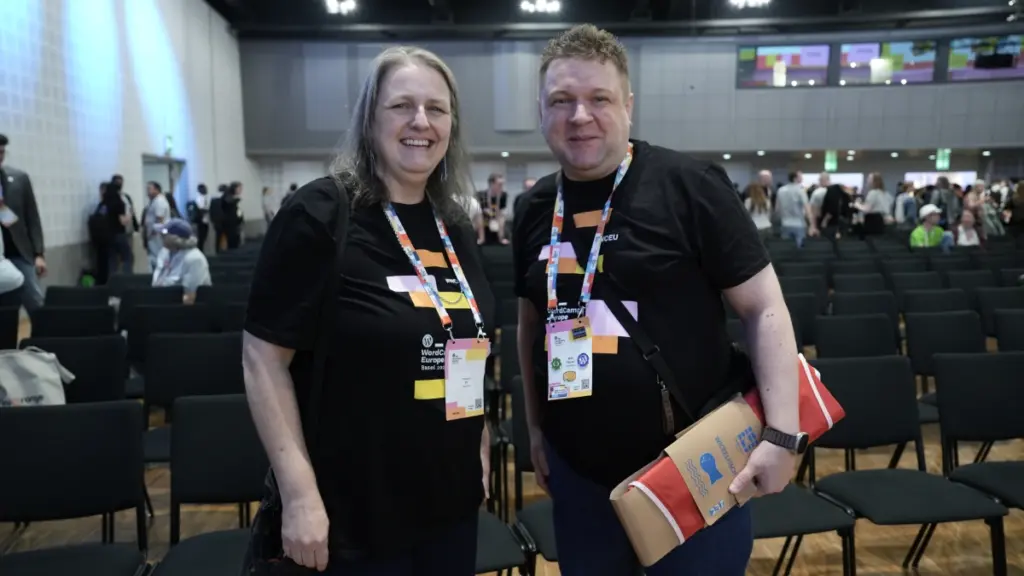
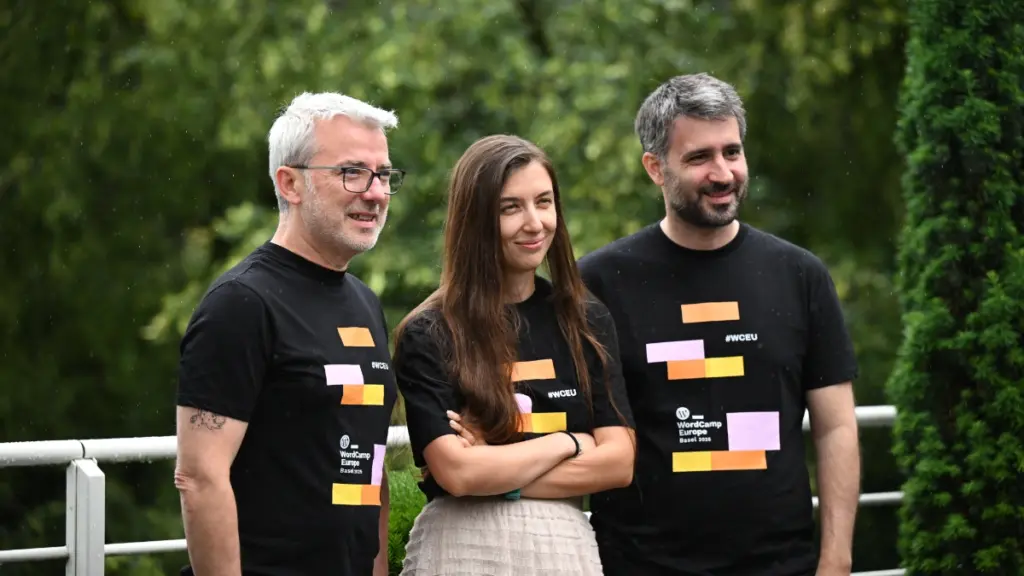
If you’ve read this far, thank you so much. Feel free to leave a comment and share the post on social media (LinkedIn, Bluesky, Mastodon, Facebook).
See you all soon at another event!
WordCamp Europe recaps by other people
- WordCamp Europe 2025 – A trip to a beautiful city – Bernhard Kau – 8 June
- WordCamp Europe 2025: how wonderful! (in English and Spanish) – Juan Hernando – 10 June
- WordCamp Europe 2025, Basel: My Recap – Lana Miro – 10 June
- WordCamp Europe : 5-7 juin 2025 à Bâle (in French) – Valérie Galassi for o2Switch – 16 June
- WordCamp Europe 2025 – Εμπειρίες, ιδέες και άνθρωποι στην καρδιά του μεγάλου Ευρωπαϊκού συνεδρίου του WordPress (in Greek) – Nevma – 17 June
- WordCamp Europe Basel 2025 – Wajari Velásquez – 18 June
- WordCamp Europe Basel 2025 (in Spanish) – Wajari Velásquez – 18 June
- WordCamp Europe 2025 Recap – Blake Whittle – 19 June
- Griezi, Basel! StellarWP at WCEU 2025 – David G. Johnson – 19 June
- Sali WordCamp Europe 2025. An Event by the WordPress.org Community – Lena Iñurrieta Rodríguez – 22 June
- Sali WordCamp Europe 2025. Un Evento de la Comunidad de WordPress.org (in Spanish) – Lena Iñurrieta Rodríguez – 22 June
- Socken, Support und Star Wars: Unser Rückblick aufs WordCamp Europe 2025 (in German) – Svetlana Marchenko for Cyon – 24 June
- Haptiq am WordCamp Europe 2025 in Basel (in German) – Claudio Rimann for Haptiq Studio – 25 June
- My experience co-organizing WordCamp Europe 2025 -Pascal Birchler – 5 July
- WordCamp Europe 2025 Recap – Ajay D’Souza – 23 July

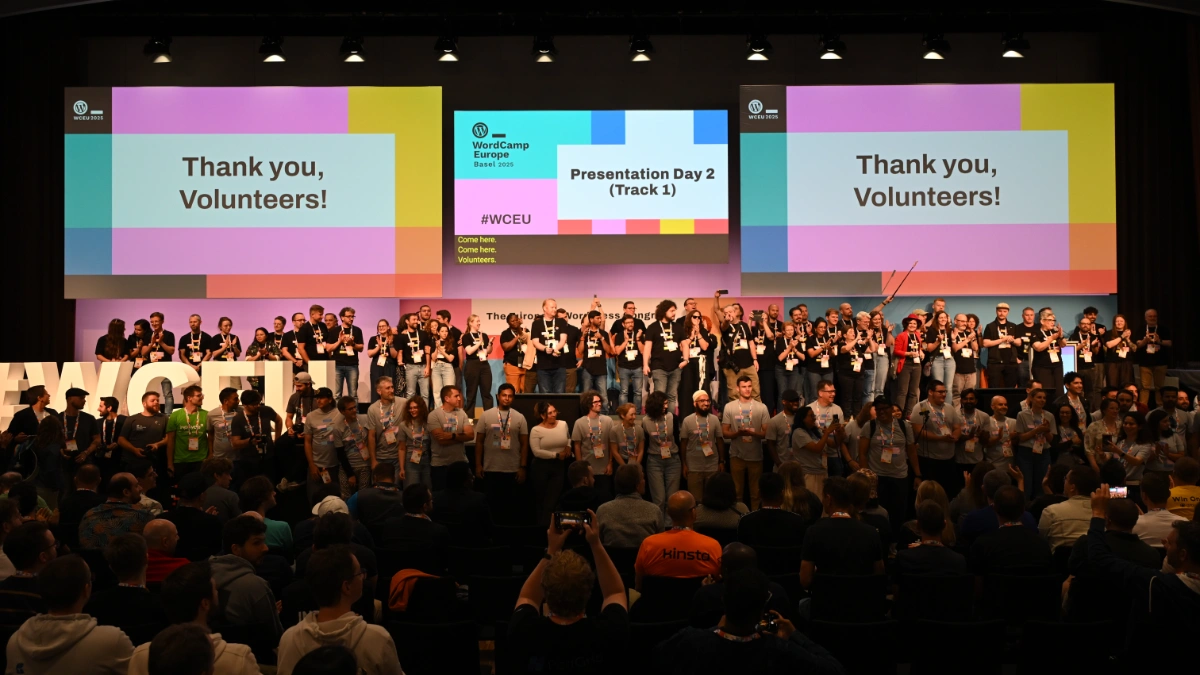
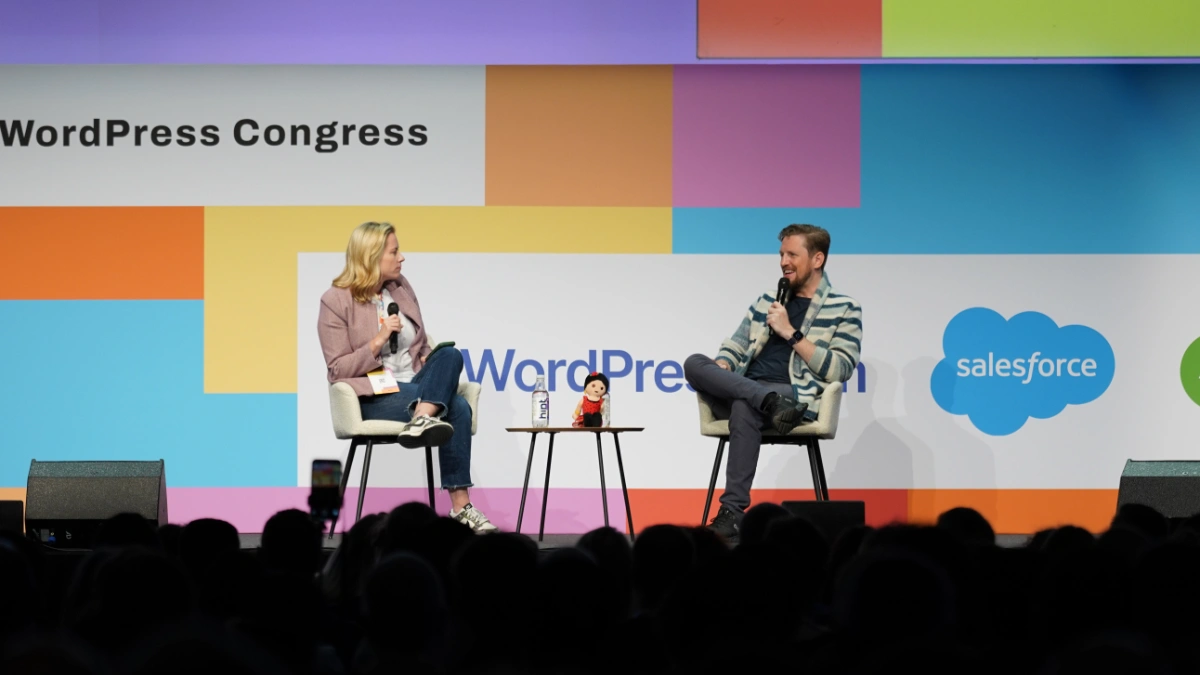

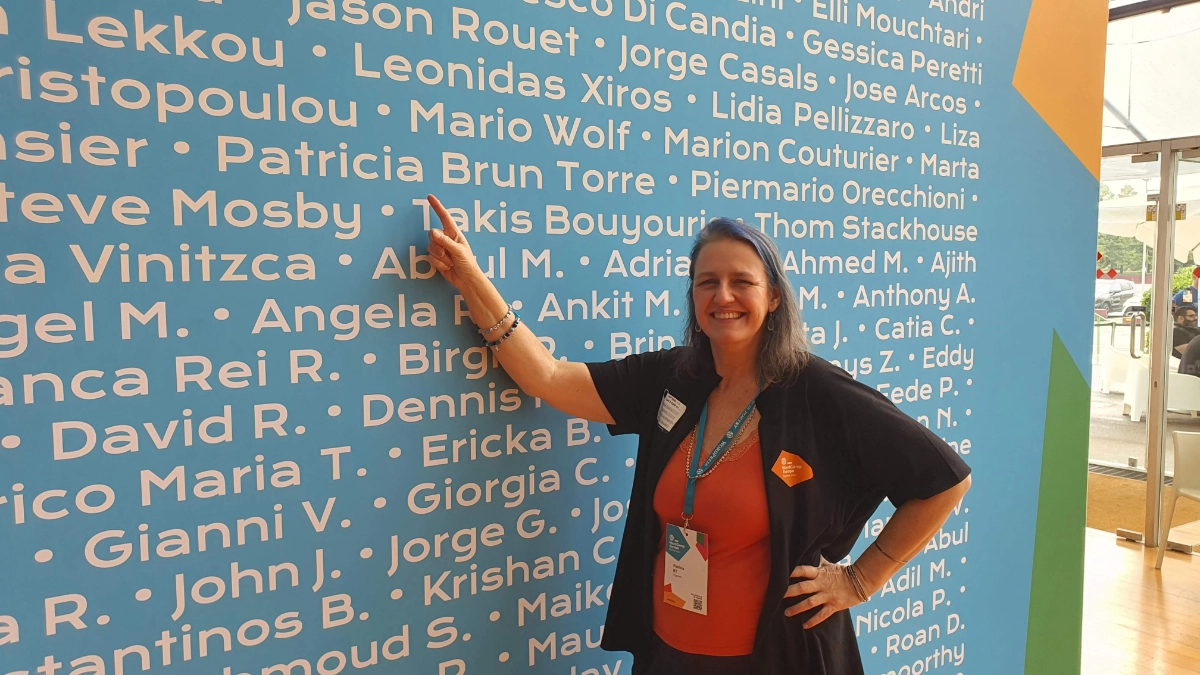
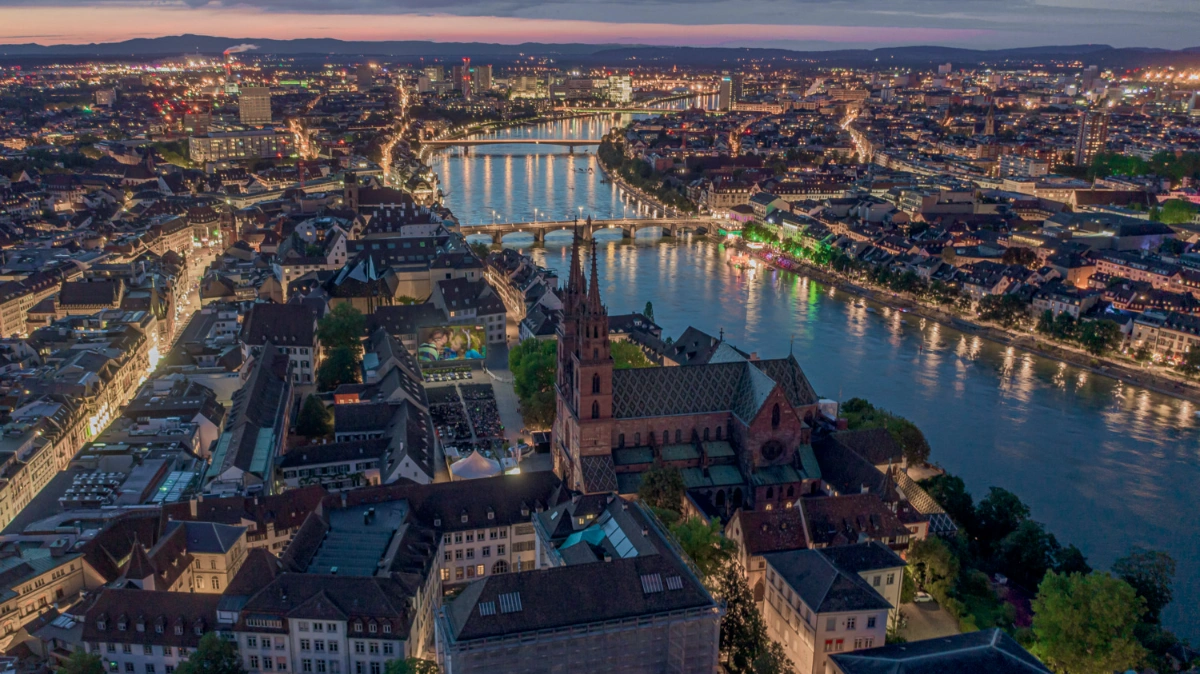
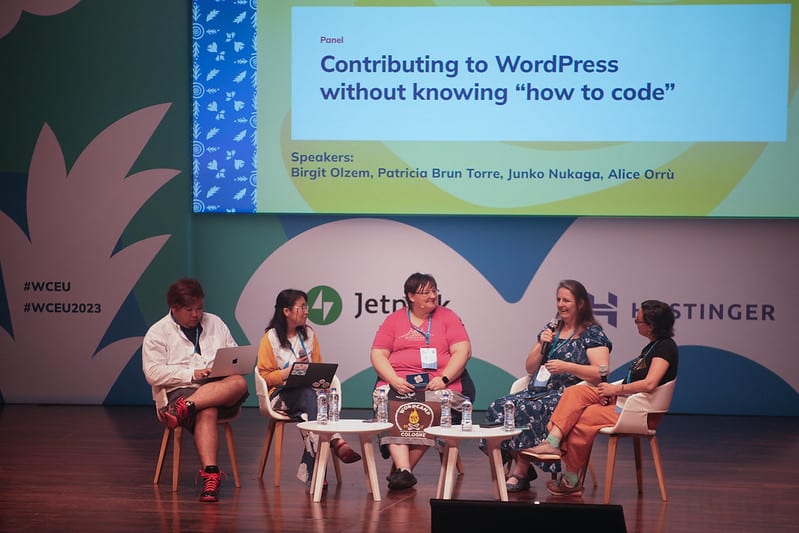
Leave a Reply to Patricia BT Cancel reply